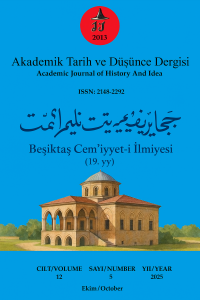Forms of In-School Assessment in Primary Grades and the Importance of Its Use in the Learning Process
Öz
This article explores the role and significance of various forms of assessment used to evaluate students’ knowledge and skills in primary schools. Assessment practices implemented at the school level serve not only to verify academic achievement but also to monitor individual student development, enhance learning motivation, and promote active participation in the educational process. Furthermore, assessment fosters collaboration among teachers, students, and parents, creating a supportive learning environment. The paper provides a comprehensive analysis of different assessment forms, their practical applications within the classroom, their contribution to tracking students’ developmental progress, and practical recommendations for primary school teachers to ensure effective implementation.
Anahtar Kelimeler
Assessment Forms Primary Education Learning Process Formative Assessment Summative Assessment
Kaynakça
- Black, P., & Wiliam, D. (1998). Assessment and classroom learning. Assessment in Education: Principles, Policy & Practice, 5(1), 7–74.
- Stiggins, R. (2005). From formative assessment to assessment for learning: A path to success in standards-based schools. Phi Delta Kappan, 87(4), 324–328.
- Hattie, J., & Timperley, H. (2007). The power of feedback. Review of Educational Research, 77(1), 81–112. https://doi.org/10.3102/003465430298487
- Popham, W. J. (2009). Assessment literacy for teachers: Faddish or fundamental? Theory Into Practice, 48(1), 4–11. https://doi.org/10.1080/00405840802577536
- Ministry of Education of the Republic of Azerbaijan. (2020). Rules for assessment in primary education. Baku, Azerbaijan: Education Publishing House.
Öz
Kaynakça
- Black, P., & Wiliam, D. (1998). Assessment and classroom learning. Assessment in Education: Principles, Policy & Practice, 5(1), 7–74.
- Stiggins, R. (2005). From formative assessment to assessment for learning: A path to success in standards-based schools. Phi Delta Kappan, 87(4), 324–328.
- Hattie, J., & Timperley, H. (2007). The power of feedback. Review of Educational Research, 77(1), 81–112. https://doi.org/10.3102/003465430298487
- Popham, W. J. (2009). Assessment literacy for teachers: Faddish or fundamental? Theory Into Practice, 48(1), 4–11. https://doi.org/10.1080/00405840802577536
- Ministry of Education of the Republic of Azerbaijan. (2020). Rules for assessment in primary education. Baku, Azerbaijan: Education Publishing House.
Öz
Kaynakça
- Black, P., & Wiliam, D. (1998). Assessment and classroom learning. Assessment in Education: Principles, Policy & Practice, 5(1), 7–74.
- Stiggins, R. (2005). From formative assessment to assessment for learning: A path to success in standards-based schools. Phi Delta Kappan, 87(4), 324–328.
- Hattie, J., & Timperley, H. (2007). The power of feedback. Review of Educational Research, 77(1), 81–112. https://doi.org/10.3102/003465430298487
- Popham, W. J. (2009). Assessment literacy for teachers: Faddish or fundamental? Theory Into Practice, 48(1), 4–11. https://doi.org/10.1080/00405840802577536
- Ministry of Education of the Republic of Azerbaijan. (2020). Rules for assessment in primary education. Baku, Azerbaijan: Education Publishing House.
Öz
Bu makale, ilkokullarda öğrencilerin bilgi ve becerilerini değerlendirmede kullanılan çeşitli değerlendirme türlerinin rolünü ve önemini incelemektedir. Okul düzeyinde uygulanan değerlendirme uygulamaları, yalnızca akademik başarıyı doğrulamayı değil, aynı zamanda öğrencilerin bireysel gelişimlerini izlemeyi, öğrenme motivasyonlarını artırmayı ve öğrenme sürecine aktif katılımlarını teşvik etmeyi amaçlamaktadır. Ayrıca değerlendirme, öğretmenler, öğrenciler ve veliler arasında iş birliğini güçlendirerek destekleyici bir öğrenme ortamı oluşturmaktadır. Bu çalışma, farklı değerlendirme biçimlerinin ayrıntılı bir analizini, sınıf içindeki uygulama örneklerini, öğrencilerin gelişimsel ilerlemelerinin izlenmesine olan katkılarını ve ilkokul öğretmenlerinin değerlendirmeyi etkili biçimde uygulayabilmeleri için pratik önerileri sunmaktadır.
Anahtar Kelimeler
Değerlendirme Türleri İlkokul Eğitimi Öğrenme Süreci Biçimlendirici Değerlendirme Düzey Belirleyici Değerlendirme
Kaynakça
- Black, P., & Wiliam, D. (1998). Assessment and classroom learning. Assessment in Education: Principles, Policy & Practice, 5(1), 7–74.
- Stiggins, R. (2005). From formative assessment to assessment for learning: A path to success in standards-based schools. Phi Delta Kappan, 87(4), 324–328.
- Hattie, J., & Timperley, H. (2007). The power of feedback. Review of Educational Research, 77(1), 81–112. https://doi.org/10.3102/003465430298487
- Popham, W. J. (2009). Assessment literacy for teachers: Faddish or fundamental? Theory Into Practice, 48(1), 4–11. https://doi.org/10.1080/00405840802577536
- Ministry of Education of the Republic of Azerbaijan. (2020). Rules for assessment in primary education. Baku, Azerbaijan: Education Publishing House.
Öz
Kaynakça
- Black, P., & Wiliam, D. (1998). Assessment and classroom learning. Assessment in Education: Principles, Policy & Practice, 5(1), 7–74.
- Stiggins, R. (2005). From formative assessment to assessment for learning: A path to success in standards-based schools. Phi Delta Kappan, 87(4), 324–328.
- Hattie, J., & Timperley, H. (2007). The power of feedback. Review of Educational Research, 77(1), 81–112. https://doi.org/10.3102/003465430298487
- Popham, W. J. (2009). Assessment literacy for teachers: Faddish or fundamental? Theory Into Practice, 48(1), 4–11. https://doi.org/10.1080/00405840802577536
- Ministry of Education of the Republic of Azerbaijan. (2020). Rules for assessment in primary education. Baku, Azerbaijan: Education Publishing House.
Öz
Kaynakça
- Black, P., & Wiliam, D. (1998). Assessment and classroom learning. Assessment in Education: Principles, Policy & Practice, 5(1), 7–74.
- Stiggins, R. (2005). From formative assessment to assessment for learning: A path to success in standards-based schools. Phi Delta Kappan, 87(4), 324–328.
- Hattie, J., & Timperley, H. (2007). The power of feedback. Review of Educational Research, 77(1), 81–112. https://doi.org/10.3102/003465430298487
- Popham, W. J. (2009). Assessment literacy for teachers: Faddish or fundamental? Theory Into Practice, 48(1), 4–11. https://doi.org/10.1080/00405840802577536
- Ministry of Education of the Republic of Azerbaijan. (2020). Rules for assessment in primary education. Baku, Azerbaijan: Education Publishing House.
Ayrıntılar
| Birincil Dil | İngilizce |
|---|---|
| Konular | Alan Eğitimleri (Diğer) |
| Bölüm | Derleme |
| Yazarlar | |
| Erken Görünüm Tarihi | 28 Ekim 2025 |
| Yayımlanma Tarihi | 27 Kasım 2025 |
| Gönderilme Tarihi | 20 Eylül 2025 |
| Kabul Tarihi | 20 Ekim 2025 |
| Yayımlandığı Sayı | Yıl 2025 Cilt: 12 Sayı: 5 |

